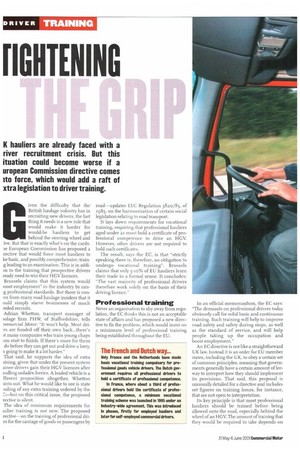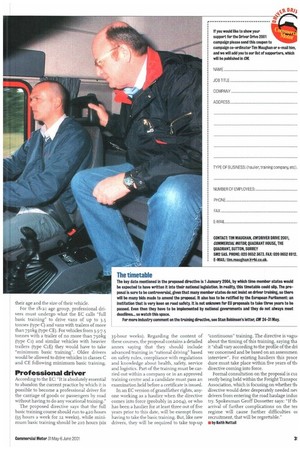TIGHTENING
Page 34

Page 35

If you've noticed an error in this article please click here to report it so we can fix it.
Given the difficulty that the British haulage industry has in recruiting new drivers, the last thing it needs is a new rule that would make it harder for would-be hauliers to get behind the steering wheel and -ive. But that is exactly what's on the cards. ae European Commission has proposed a rective that would force most hauliers to ke basic, and possibly comprehensive, train. .g leading to an examination. This is in ad di. )n to the training that prospective drivers ready need to win their HGV licences.
Brussels claims that this system would ■ oost employment" in the industry by raisg professional standards. But there is conrn from many road haulage insiders that it ould simply starve businesses of much .eded recruits.
Adrian Whetton, transport manager of iulage firm PHW, of Staffordshire, tells )mmercial Motor "It won't help. Most ciriTs are funded off their own back.. .there's )t many companies who train young chaps am start to finish. If there's more for them do before they can get out and drive a lorry, s going to make it a lot harder."
That said, he supports the idea of extra Uning, given that under the present system since drivers gain their HGV licences after indling unladen lorries. A loaded vehicle is a fferent proposition altogether, Whetton Ants out. What he would like to see is state nding of any extra training ordered by the 7.—but on this critical issue, the proposed rective is silent.
The idea of minimum requirements for Luther training is not new. The proposed
rectivc on the training of professional drirs for the carriage of goods or passengers by
road—updates EEC Regulation 3820/85, of 1985, on the harmonisation of certain social legislation relating to road transport.
It lays down requirements for vocational training, requiring that professional hauliers aged under 21 must hold a certificate of professional competence to drive an HGV However, other drivers are not required to hold such certificates.
The result, says the EC, is that "strictly speaking there is, therefore, no obligation to undergo vocational training". Brussels claims that only 5-10% of EU hauliers learn their trade in a formal sense. It concludes: "The vast majority of professional drivers therefore work solely on the basis of their driving licence."
Professional training
Never an organisation to shy away from regulation, the EC thinks this is not an acceptable state of affairs and has proposed a new directive to fix the problem, which would insist on a minimum level of professional training being established throughout the EU. In an official memorandum, the EC says: "The demands on professional drivers today obviously call for solid basic and continuous training. Such training will help to improve road safety and safety during stops, as well as the standard of service, and will help people taking up the occupation and boost employment."
An EC directive is not like a straightforward UK law. Instead it is an order for EU member states, including the UK, to obey a certain set of common principles, meaning that governments generally have a certain amount of leeway to interpret how they should implement its provisions. That said, this proposal is unusually detailed for a directive and includes set figures on training hours, for instance, that are not open to interpretation.
Its key principle is that most professional hauliers should be trained before being allowed onto the road, especially behind the wheel of an HGV. The amount of training that they would be required to take depends on their age and the size of their vehicle.
For the 18-21 age group, professional drivers must undergo what the EC calls "full basic training" to drive vans of up to 3.5 tonnes (type C) and vans with trailers of more than 750kg (type CE). For vehicles from tonnes with a trailer of no more than 750kg (type CI) and similar vehicles with heavier trailers (type CIE) they would have to take "minimum basic training". Older drivers would be allowed to drive vehicles in classes C and CE following minimum basic training.
Professional driver
According to the EC: "It is absolutely essential to abandon the current practice by which it is possible to become a professional driver for the carriage of goods or passengers by road without having to do any vocational training."
The proposed directive says that the full basic training course should run to 420 hours (35 hours a week for 12 weeks), while minimum basic training should be zio hours (six
35-hour weeks). Regarding the content of these courses, the proposal contains a detailed annex saying that they should include advanced training in "rational driving" based on safety rules, compliance with regulations and knowledge about health, safety, service arid logistics. Part of the training must be carried out within a company or in an approved training centre and a candidate must pass an examination held before a certificate is issued.
In an EC version of grandfather rights, anyone working as a haulier when the directive comes into force (probably in 2004), or who has been a haulier for at least three out of five years prior to this date, will be exempt from having to take the basic training. But, like new drivers, they will be required to take top-up "continuous" training. The directive is vagu. about the timing of this training, saying tha it "shall vary according to the profile of the dri ver concerned and be based on an assessmen interview". For existing hauliers this proce dure must take place within five years of th, directive coming into force, Formal consultation on the proposal is cur rently being held within the Freight Transpor Association, which is focusing on whether th. directive would deter desperately needed nev drivers from entering the road haulage indus try. Spokesman Geoff Dossetter says: "If tb. arrival of further complications on the tes regime will cause further difficulties oi recruitment, that will be regrettable."
































































































